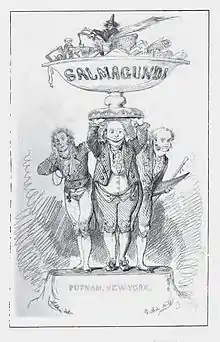Salmagundi (periodical)
Salmagundi; or The Whim-whams and Opinions of Launcelot Langstaff, Esq. & Others, commonly referred to as Salmagundi, was a 19th-century satirical periodical created and written by American writer Washington Irving, his oldest brother, William, and James Kirke Paulding. The collaborators produced twenty issues at irregular intervals between January 24, 1807 and January 15, 1808.
 From an 1869 reprint | |
| Author | Washington Irving (with James Kirke Paulding and William Irving, Jr.) |
|---|---|
| Original title | Salmagundi; or The Whim-whams and Opinions of Launcelot Langstaff, Esq. & Others |
| Country | United States |
| Language | English |
| Genre | Satire |
| Publisher | David Longworth (New York City) |
Publication date | 1807-1808 |
| Media type | Print (Periodical) |
| ISBN | 978-0-940450-14-1 (reprint) |
| OCLC | 9412147 |
| 818/.209 19 | |
| LC Class | PS2052 1983 |
Salmagundi lampooned New York City culture and politics in a manner much like today's Mad magazine.[1] It was in the November 11, 1807, issue that Irving first attached the name "Gotham" to New York City, based on the alleged stupidity of the people of Gotham, Nottinghamshire.[2]
Irving and his collaborators published the periodical using a wide variety of pseudonyms, including Will Wizard, Launcelot Langstaff, Pindar Cockloft, and Mustapha Rub-a-Dub Keli Khan.
Irving and Paulding discontinued Salmagundi in January 1808, following a disagreement with publisher David Longworth over profits.
Notes
- Jones, 82.
- Burrows, Edwin G. and Mike Wallace. Gotham: A History of New York City to 1898. (Oxford University Press, 1999), 417.
References
Further reading
- Hankins, Laurel V. "The Art of Retreat: Salmagundi’s Elbow-Chair Domesticity." Nineteenth Century Literature 71.4 (2017): 431-456 online.
